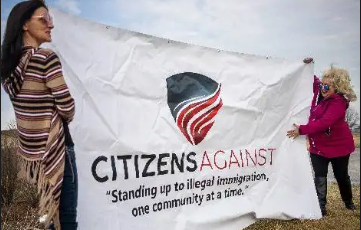
Alma — They received hate mail, were accosted at social settings, had strangers knocking on their doors. They were picketed, petitioned and targeted in a recall attempt.
Now the Alma City Commission is facing critics who are pressuring the city’s insurance company to drop its liability coverage, which is required for the commissioners to hold office.
The commission’s sin? In September, it approved zoning for a temporary shelter for boys who crossed the U.S.-Mexico border without their parents.
The issue split the community, pitting the mayor against the city manager, the city commission against the planning board, one citizen against another.
The national fight over immigration has come to a small city in the middle of Michigan.
Shelter opponents said the migrants will be beholden to gangs who they believe facilitated their journeys, saying the debts will be paid by selling drugs or their bodies.
“They’re not all vetted at the border,” said Yvette Clark, one of the leaders of the fight against the zoning. “They stay here indefinitely. Taxpayers pay their way to live here.”
City Commissioner Audra Stahl said the controversy is the worst thing she has experienced during her time on the board. When she was elected in 2018, Stahl said she had no idea her privacy would be invaded, her character assassinated and her integrity called into question.
“I have to wonder who the hell would ever want to (be a commissioner),” Stahl said. “It’s not easy these days. People are not kind. When we give our opinions, we’re not doing it in the nicest way.”
One good thing about the furor, she said, is it shows what some people are really like, including those with discomfiting views on race. She said she would no longer patronize the businesses of such people.
Trump country
Most migrant shelters are located along the southern border but so many unaccompanied children entered the United States last year that facilities were proposed throughout the country.
Even in a Donald Trump-loving part of Michigan that is 1,300 miles away from Mexico.
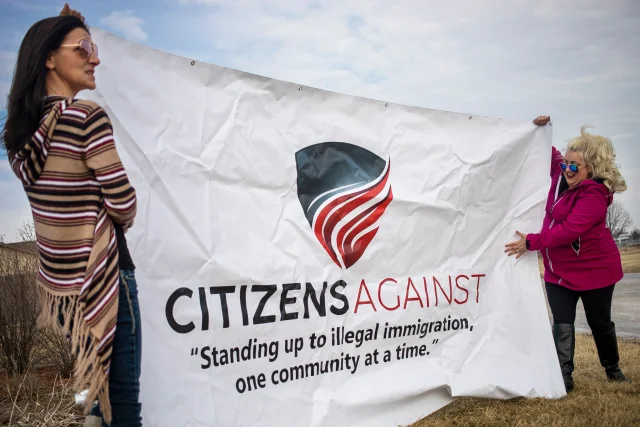
The 9,400 residents of Alma have wildly divergent views of their upcoming visitors.
One side refers to them as refugees. The other calls them illegal immigrants.
Pat Luetkemeier, who led a group supporting the shelter, sees them as children fleeing violence, gangs and poverty in Central America.
“It’s the right thing to do,” she said. “I thought it was a win-win for everybody. I had no idea there would be this much backlash.”
But Clark disagrees.
She said the U.S. should help all the Americans who are struggling before opening facilities for outsiders. She said her grandfather was born in Mexico but entered the U.S. legally.
‘Everything … is a controversy’
Don Ayers knew the July meeting of the Alma Planning Commission would draw a big crowd. That’s why it was moved to the auditorium of Alma High School.
But Ayers, the commission chairman, wasn’t expecting this. About 400 people turned out, and they were revved up.
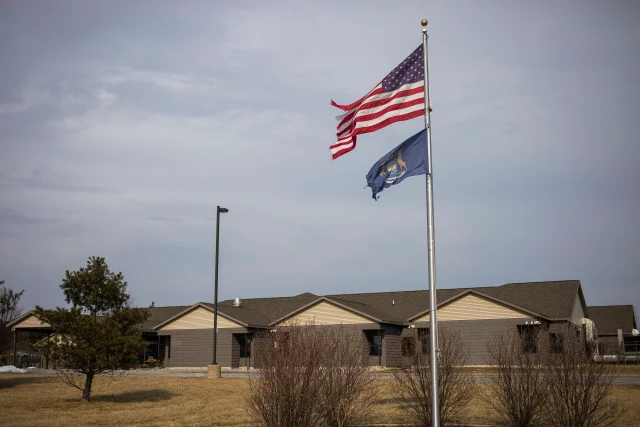
When the meeting began with the taking of attendance, the crowd started shouting, according to a city recording of the proceedings. They wanted to say the Pledge of Allegiance. Ayers said it would be done after the roll call, but the audience didn’t wait.
Half of the crowd stood up and said the pledge, and then burst into applause. Later in the meeting, one speaker, just for good measure, recited it again.
While giving an overview of the zoning issue, Alma City Attorney Tony Costanzo encouraged the audience to behave itself.
“I know you guys are charged up. Everybody is,” he said. “But this isn’t Facebook. This is democracy in action.”
The police were present, “just in case,” he said.
Of the 40 speakers, 25 opposed the shelter, according to the recording.
Resident Ann Evans wondered if the facility, prison-like, would be surrounded by concertina wire. She lamented that, while growing up in nearby Riverdale, she never worried about people breaking into her home.
“If I wanted to live in a big town and have to worry about having my doors locked all the time, I’d move to Detroit,” she said.
After the public spoke, Ayers said he disagreed with Biden’s immigration policy, which he said caused dissension across America. He said Alma couldn’t influence national directives but could limit their impact on the city.
He voted against a zoning change that would allow the shelter to open.
Alma City Manager Matt Schooley, a member of the planning board, said he’s been a mediator during his entire career, first as a police officer and then as city manager. But there was no mediating this, he said.
Schooley said the dispute stopped being about zoning a long time ago, if it ever was. He felt like the planning commission was being asked to pick a side in a political fight.
“Finding common ground for much of anything in today’s world is nearly impossible,” he said, becoming emotional. “Everything we go through right now is a controversy: mask, no mask; vaccine, don’t vaccine; approve this zoning, don’t approve this zoning.”
Schooley, who retired in September, also voted against the rezoning, saying the city was too divided over the issue.
The board, which is an advisory panel, voted 4-2 to recommend that the city commission reject the change in zoning.
Scare tactics and rumor-mongering
No one in Alma could remember the city commission ever rejecting a recommendation by the planning board.
But the commission said the planning board failed to research the zoning matter. Commissioner Roger Allman said Ayers had made up his mind before considering the issue. Ayers accused the commission of the same thing.
Allman also dismissed the arguments of shelter foes, saying that, in their voluminous emails, letters, public comments and social media postings, they failed to cite a single fact, that it was all scare tactics and rumor-mongering.
“I heard conjecture, fear, what-ifs and maybes,” he told The Detroit News.
Allman said Bethany Christian Services has a proven track record and that he and two other commissioners visited a Bethany facility in Grand Rapids, finding it well run with a negligible impact on its residential neighborhood.
“They didn’t do their job,” he said about the planning board. “You’re supposed to do an investigation. We did our own research.”
The commission voted 4-2 to approve the rezoning in September.
Mayor Greg Mapes, who sits on both the planning board and city commission, has a longtime connection with Masonic Pathways, a retirement community organization that owns the building where the shelter will be located.
He has been a mason for 40 years and was president of the Pathways board from 2010 to 2016.
Mapes made a motion to approve the zoning during a planning board meeting in July but, after the city attorney said he might have a conflict of interest, recused himself from the board vote in August.
He then said he planned to vote on the matter when it went before the city commission but changed his mind again and refrained from voting. Mapes wrote a column in the local newspaper supporting the project.
He didn’t respond to calls, texts or emails from The News.
A failed recall effort
Ayers, who attended the meeting where the city commission approved the rezoning, submitted a letter of resignation several moments after the vote. He had been on the planning board for 15 years.
He told the city commission he was tired of being called names by residents.
“I used to really enjoy being on the planning commission,” Ayers said. “But the last few months really sucks. It just isn’t fun anymore. I’m done.”
Four days later, he joined a group of people picketing in front of the shelter, according to the group’s video. Wearing a camouflage Trump cap, he held a sign that showed how much money Masonic Pathways would receive for leasing the building to Bethany.
Ayers began posting and reposting anti-immigration messages on Facebook. When residents signed a petition to hold a recall election against several commissioners, he submitted the signatures to City Hall.
The recall fizzled when the group failed to get enough signatures by Dec. 31.
Ayers declined to talk to The News.
Targeting the city’s insurer
Citizens Against hasn’t given up. The group, which has been fighting the rezoning since May, met last month at the Alma Public Library to discuss its newest strategy. The meeting was attended by nine people and a reporter.
The leader, Robi Rodriguez, said she had just filed claims with the city’s insurance company, Michigan Municipal Risk Management Authority.
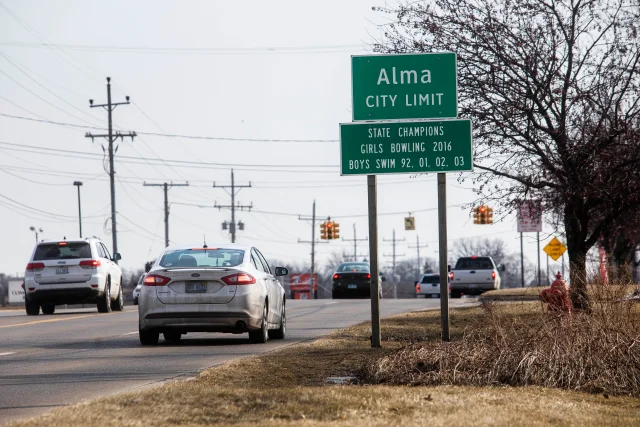
The 20-page request accused Mapes and the four city commissioners who supported the shelter of violating city, state and federal laws. Rodriguez, whose husband is Hispanic, said later she didn’t want to describe the specific violations while the case was pending.
She punctuated any criticism of the commissioners with “I believe” or “in my opinion,” saying she didn’t want to be sued for slander.
“We will not stop,” Rodriguez said. “I’m not afraid of people. I’m just not and I have no problem showing it. I’m just confident. You wouldn’t want to try to intimidate me.”
The unorthodox strategy was recently introduced by conservative groups fighting school boards in other parts of the U.S., usually in opposition to their COVID or diversity policies.
Alma officials said their insurer is reviewing the matter.
But legal experts don’t give such tactics much chance of success. They’ve had little impact thus far, including a campaign in Iowa, said Kelly Shaw, an associate professor of political science at Iowa State University.
“(It’s an) attempt to get one’s way through intimidation. That typically doesn’t work in our political system,” Shaw said.
Cities carry such insurance to protect them from financial losses that result from illegal or unethical behavior by employees or elected officials. Any claims are normally filed by the city.
But that didn’t stop Rodriguez from trying to recruit more claimants.
Writing on a whiteboard in the library conference room, she showed how to file a claim. An elderly couple took notes on a pad.
Rodriguez described how she and group member Meredith Loomis attended a recent city commission meeting to tell the commissioners about the filing of the claims.
“What did they do?” asked the woman taking notes.
“Their faces were great,” said Loomis.
“It wasn’t the faces I was used to seeing,” said Rodriguez. “It wasn’t smugness. There wasn’t smirking. I’ll just say this: If that’s as far as we’ll ever get, I can be content.”
Even if the city’s insurer decides the claims are baseless, Rodriguez said she hopes to inundate the company with so many that it decides the coverage is too much of a hassle to continue.
Thus far she and two group members have filed claims. She hopes to get 10 people to do so, feeling that’s the magic number to get the insurance company to leave the city.
When she asked the audience if anyone wanted to fill out the paperwork, however, she didn’t receive any takers.
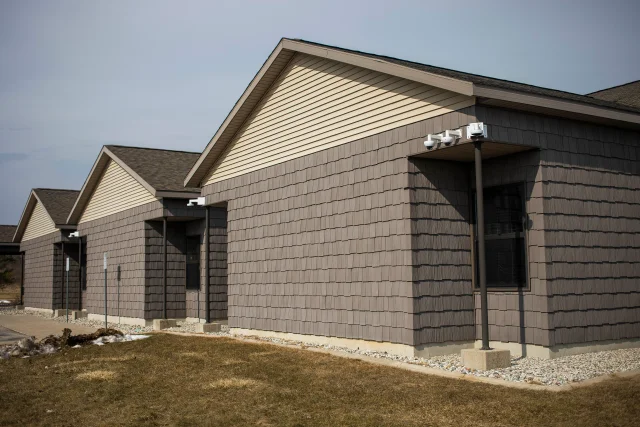
‘This has not been Alma’s finest hour’
Bethany Christian Services is putting the final touches on the new shelter and hiring the last of its staff.
The nursing home furnishings have been replaced with children’s beds and dressers, said Bethany officials. Alarms and surveillance cameras have been installed at every door. Discarded boxes filled a dumpster behind the building last week.
No signs showed what the building once was or what it will be.
Out front, an old American flag, a holdover from the old occupant, waved in a stiff wind, its frayed edges in tatters.
Nick Piccolo, one of the city commissioners who supported the rezoning, said the controversy that seized Alma will eventually fade away. What won’t dissipate, he said, will be the memories of how people treated each other.
Residents need to realize the people they disagree with aren’t blood enemies, he said. They’re just neighbors or friends who view the world differently.
If people don’t realize that, the town will remain broken.
“This has not been Alma’s finest hour,” Piccolo said. “I would strongly recommend: Listen to your neighbor just for understanding, not even for agreement. Practice grace with those whom you disagree.”
*story by The Detroit News


